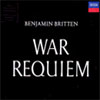Britten War Requiem
View record and artist detailsRecord and Artist Details
Composer or Director: Benjamin Britten
Label: Decca
Magazine Review Date: 4/1985
Media Format: CD or Download
Media Runtime: 132
Mastering:
ADD
Catalogue Number: 414 383-2DH2

Tracks:
| Composition | Artist Credit |
|---|---|
| War Requiem |
Benjamin Britten, Composer
Bach Choir Benjamin Britten, Conductor Benjamin Britten, Composer Dietrich Fischer-Dieskau, Baritone Galina Vishnevskaya, Soprano Highgate School Choir London Symphony Chorus London Symphony Orchestra Melos Ensemble Peter Pears, Tenor Simon Preston, Organ |
Author: Alan Blyth
Decca has used the most recent digital and CEDAR technology to improve the original sound of this classic under the overall supervision of veteran technician James Lock. Very attentive and sharp ears will no doubt appreciate a subtle enhancement in clarity and definition over the previous (1985) transfers of the original Kingsway Hall recording, but on extensive A/B comparisons, using electrostatic speakers, I found only marginal improvements, so those with the older set shouldn’t worry too much that they have lost out. The chief gain is in the virtual elimination of tape hiss. Newcomers, and there should be plenty of those wanting this – one of the great performances of recording history – should acquire this new version.
The problem with the older set was that it offered poor value. Now, as an imaginative bonus, Decca – with the approval of the Britten Estate – gives us the first issue of a long rehearsal tape. This was made by the producer John Culshaw without Britten’s approval. When Culshaw presented it to the composer on his 50th birthday, Britten was ‘appalled’, considering it a betrayal of trust and ‘an unauthorised invasion of a territory exclusively his own and his performers’,’ as Donald Mitchell relates in the booklet. Now Mitchell believes that we should be allowed ‘to assess the tape as a contribution to our knowledge of him [Britten] as a performer and interpreter of his own music and to our understanding of the War Requiem itself.’
Throughout this fascinating aural document you hear evidence of Britten’s vision of his own music, his astonishing ear for timbre and intimate details, above all his wonderful encouragement of all his forces, culminating in his heart-warming words of thanks at the end of the sessions, not to mention his nice, tension-breaking sense of humour and a couple of sharp comments from Vishnevskaya, who remains unsurpassed as soprano soloist. I found all this greatly instructive and genuinely moving. One comment is particularly illuminating. Britten suggests that the two male soloists are very present on earth, humans involved in the horror of war, while the soprano soloist and the chorus represent another, ritual level of expression. The merit of this ground-breaking performance and recording is that it so arrestingly conveys Britten’s intentions. We are lucky now to have not only the composer’s personal and irreplaceable reading refurbished, but also his commentary on it suggested by the rehearsal sequences.'
The problem with the older set was that it offered poor value. Now, as an imaginative bonus, Decca – with the approval of the Britten Estate – gives us the first issue of a long rehearsal tape. This was made by the producer John Culshaw without Britten’s approval. When Culshaw presented it to the composer on his 50th birthday, Britten was ‘appalled’, considering it a betrayal of trust and ‘an unauthorised invasion of a territory exclusively his own and his performers’,’ as Donald Mitchell relates in the booklet. Now Mitchell believes that we should be allowed ‘to assess the tape as a contribution to our knowledge of him [Britten] as a performer and interpreter of his own music and to our understanding of the War Requiem itself.’
Throughout this fascinating aural document you hear evidence of Britten’s vision of his own music, his astonishing ear for timbre and intimate details, above all his wonderful encouragement of all his forces, culminating in his heart-warming words of thanks at the end of the sessions, not to mention his nice, tension-breaking sense of humour and a couple of sharp comments from Vishnevskaya, who remains unsurpassed as soprano soloist. I found all this greatly instructive and genuinely moving. One comment is particularly illuminating. Britten suggests that the two male soloists are very present on earth, humans involved in the horror of war, while the soprano soloist and the chorus represent another, ritual level of expression. The merit of this ground-breaking performance and recording is that it so arrestingly conveys Britten’s intentions. We are lucky now to have not only the composer’s personal and irreplaceable reading refurbished, but also his commentary on it suggested by the rehearsal sequences.'
Discover the world's largest classical music catalogue with Presto Music.

Gramophone Digital Club
- Digital Edition
- Digital Archive
- Reviews Database
- Full website access
From £8.75 / month
Subscribe
Gramophone Full Club
- Print Edition
- Digital Edition
- Digital Archive
- Reviews Database
- Full website access
From £11.00 / month
Subscribe
If you are a library, university or other organisation that would be interested in an institutional subscription to Gramophone please click here for further information.




